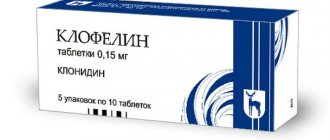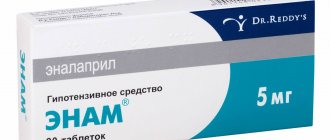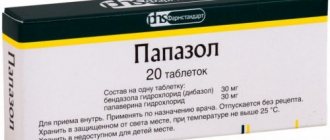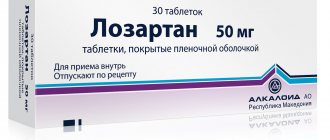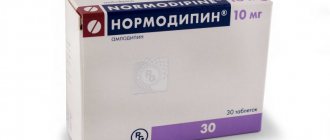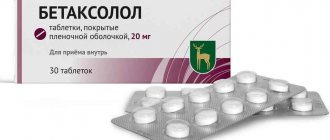General information about the drug
The blood pressure drug Nebilet belongs to the group of selective beta-blockers. It is characterized by the presence of a hypotensive effect, antianginal and antiarrhythmic properties.
Release form and packaging
The manufacturer produces Nebilet in tablet form. Intended for internal oral use. The tablets are separated by special notches that facilitate the dosing process.
The drug is sold in cardboard boxes containing from 1 to 4 blisters (each blister contains 14 tablets).
Compound
The main active component included in the Nebilet blood pressure tablets is nebivolol at a dosage of 5 mg. The auxiliary ingredients of the drug include magnesium stearate, starch, silicon dioxide, lactose monohydrate, croscarmellose sodium.
Packaging of Nebilet tablets
Cost and conditions of dispensing from a pharmacy
The cost of the drug depends on the number of tablets contained in the package. The average price for Nebilet varies from 500 to 1000 rubles.
You can purchase medicine in pharmacy chains only by presenting an appropriate prescription from your attending physician.
Storage conditions
It is recommended to store Nebilet tablets in a dark and dry place out of reach of small children and pets. The optimal temperature for storing the drug is no higher than +25 °C. The maximum shelf life of Nebilet tablets is 3 years from the date of release of the medicine.
Pharmacokinetic characteristics
Nebilet blood pressure tablets are characterized by a pronounced antihypertensive effect. The drug stabilizes blood pressure, pulse rate, and normalizes heart rhythm. It has moderate vasodilating properties.
The therapeutic effect is achieved due to the ability of the active ingredients of Nebilet to suppress specific adrenergic receptors, slowing down the processes of production of the hormone adrenaline.
The drug significantly reduces the need for oxygen in the myocardium and heart muscle. Increases the resistance of the cardiovascular system to physical activity and other external factors.
Reduces the likelihood of angina attacks. Slows down atrioventricular conduction, normalizing heart rate and eliminating signs of arrhythmia.
The blood pressure medicine Nebilet has a cumulative effect. The results of treatment become noticeable after 1.5-2 weeks from the start of taking the tablets. Blood pressure and heart rate levels are fully stabilized after a month of treatment.
The principle of action of adrenergic blockers
Analogs
Analogues of Nebilet by code ATX+ and by active ingredients are:
- Nebil;
- Nebicard;
- Nebitrend;
- Nodon.
Atenolol tablets
Other analogues:
- Atenolol;
- Concor;
- Bisoprolol;
- Coronal;
- Bicard;
- Bidop.
Pharmacodynamics and principle of operation
The active ingredients of the drug are quickly absorbed into the blood when the tablets enter the gastrointestinal tract. The effect of Nebilet becomes noticeable 2-3 hours after taking the medication. The effect of the drug lasts throughout the day, which allows you to avoid frequent pill taking.
Nebilet to reduce blood pressure works as follows:
- Dilates blood vessels and activates blood circulation processes, microcirculation, by suppressing the production of renin, aldosterone and angiotensin;
- Reduces the load on the heart, eliminating hypoxia and stimulating blood circulation and microcirculation;
- Blocks receptors that interact with adrenaline, thus reducing blood pressure;
- Reduces the level of atrioventricular conduction;
- Reduces the degree of cardiac activity;
- It has a vasodilating effect, promoting the expansion of blood vessels and their lumens;
- Eliminates symptoms characteristic of oxygen deficiency.
Thanks to the properties and features of action listed above, it helps with blood pressure and improves the general condition of a patient with diagnosed cardiovascular pathologies.
Bioavailability indicators are individual for each user and depend on the speed of metabolic processes. With an active metabolism, they are about 12%, and in people with a slow metabolism they can reach 90% or more.
In the liver it is transformed into active hydroxymetabolites. The half-life varies from one day to 2 days depending on the metabolic rate.
The drug is completely eliminated from the user’s body after a week from the moment of taking the last tablet, mainly with feces through the gastrointestinal tract. A small percentage of the medication is excreted through the renal apparatus.
Pharmacological properties of the drug Nebilet
Pharmacodynamics. Nebivolol is a racemate consisting of two enantiomers: SRRR-nebivolol (or D-nebivolol) and RSSS-nebivolol (or L-nebivolol). It combines two pharmacological properties:
- due to its D-enantiomer, nebivolol is a competitive and selective β1-adrenergic receptor blocker;
- Thanks to its L-enantiomer, it has a mild vasodilator effect due to metabolic interaction with L-arginine/nitric oxide (NO).
With single and repeated use of nebivolol, heart rate at rest and during exercise decreases in both individuals with normal blood pressure and in patients with hypertension (arterial hypertension). The hypotensive effect persists with long-term treatment. At therapeutic doses, α-adrenergic antagonism does not develop. Nebivolol does not have sympathomimetic activity. In therapeutic doses it does not have membrane stabilizing activity. In healthy probands, nebivolol does not have a significant effect on exercise tolerance. Pharmacokinetics . After oral administration, both enantiomers of nebivolol are rapidly absorbed from the digestive tract. Eating does not affect the absorption of the drug. Metabolized in the body to form active hydroxymetabolites. The bioavailability of orally administered nebivolol averages 12% in individuals who metabolize the drug rapidly and is almost complete in individuals who metabolize the drug slowly. Based on the different rates of metabolization, dosing of Nebilet should be carried out taking into account the individual characteristics of the patient. When steady state is achieved using equal doses of the drug, the maximum concentration of unchanged nebivolol in slow metabolizers is approximately 23 times higher than in fast metabolizers; Taking this into account, people with slow metabolism are prescribed the drug in lower doses. In fast metabolizers, the half-life of nebivolol enantiomers averages 10 hours; in slow metabolizers, the half-life is 3–5 times longer. Plasma concentrations range from 1 to 30 mg of nebivolol and are proportional to the dose. The patient's age does not affect the pharmacokinetics of nebivolol.
Who should use it?
Doctors recommend that patients use Nebilet for high blood pressure if they have the following clinical indications:
- Arterial hypertension;
- Ischemic disease;
- Heart failure occurring in the first or second stage;
- Hypertonic disease;
- Angina pectoris.
The drug is prescribed for therapeutic and prophylactic purposes. Allows you to reduce the likelihood of attacks of angina pectoris, hypertensive crisis that occurs against the background of excessively high blood pressure.
Antihypertensive drug protects against the dangerous effects of high blood pressure
For whom is it contraindicated?
Drinking Nebilet with high blood pressure is strictly prohibited for users who have the following clinical contraindications:
- Bronchial asthma;
- Hypotonic disease (low blood pressure);
- Pheochromocytoma;
- Individual intolerance and hypersensitivity to the components contained in the tablets;
- Shock state of cardiogenic nature;
- Bradycardia (slow heart rate);
- Metabolic acidosis;
- Hypokalemia;
- Disruption of peripheral circulatory processes;
- Hypocalcemia;
- Severe liver pathologies;
- Heart failure occurring in acute form;
- Obstructive pathologies of pulmonary tissue structures;
- Hyponatremia;
- Pathologies of the sinus node;
- Cardiomegaly;
- Bronchial spasms;
- Myasthenia;
- Severe depressive states;
- Increased tendency to exhibit allergic reactions.
Despite the fact that Nebilet lowers blood pressure effectively and quickly, the drug is contraindicated for the treatment of young patients under the age of majority, women expecting the birth of a baby, and breastfeeding mothers.
With great caution, tablets are prescribed to persons suffering from diabetes, psoriasis, renal dysfunction, and thyroid pathologies.
Tablets are used with caution for thyroid diseases
Contraindications
- bronchial asthma;
- acute heart failure;
- chronic heart failure in the stage of decompensation;
- pheochromocytoma;
- severe liver dysfunction;
- metabolic acidosis;
- depression;
- angiospastic angina (Prinzmetal's angina);
- obliterating peripheral vascular diseases (intermittent claudication);
- arterial hypotension;
- cardiogenic shock;
- bradycardia (heart rate less than 50 beats/min);
- SSSU;
- AV block II and III degrees;
- sinoatrial block;
- myasthenia gravis, muscle weakness;
- children and adolescents up to 18 years of age;
- hypersensitivity to nebivolol.
Adverse reactions
The use of Nebilet for high blood pressure may cause the following side effects:
- Attacks of dizziness;
- Nausea and vomiting;
- Skin itching;
- Flatulence;
- Constant feeling of dryness in the mouth;
- Headache;
- Nightmarish dreams;
- Flatulence;
- Paresthesia;
- Chronic fatigue syndrome;
- Abnormal stool (diarrhea or constipation);
- Painful sensations localized in the abdominal area;
- Redness of the skin;
- Dyspnea;
- Erectile dysfunction and the stronger sex;
- Bronchospasms;
- Rash on the skin like urticaria;
- Heart rhythm disturbances;
- Slow heart rate;
- Photodermatosis;
- Raynaud's syndrome;
- Hypotonic crisis (excessive decrease in blood pressure);
- Swelling of the skin and mucous membranes;
- Decreased visual acuity;
- Feeling of ringing and noise in the ears;
- Erythema;
- Anemia;
- Hyperhidrosis;
- Sleep disturbances and natural biorhythms (insomnia at night and increased sleepiness during the daytime);
- Dyspepsia.
In most cases, the drug is well tolerated, and side effects occur either in the presence of contraindications or individual intolerance, or when recommended doses are exceeded. Regardless of the reasons, if any adverse reactions are detected, you should stop taking the pills and seek advice from a specialist. You may need to adjust the dosage or select an analogue.
Side effects of taking the pills may include dizziness and headache
Side effects of the drug Nebilet
The observed side effects are in most cases mild or moderate, classified according to organ systems and the frequency of their occurrence.
Organ system | Sometimes (1–10%) | Occasionally (0.1–1%) |
| Central nervous system disorder | Headache, dizziness, paresthesia | Nightmares |
| Visual disorders | Visual impairment | |
| Functional disorders of the heart | Bradycardia, heart failure, prolonged AV conduction/AV block | |
| Functional vascular disorders | Hypotension, worsening intermittent claudication | |
| Functional disorders of the respiratory system and mediastinal organs | Dyspnea | Bronchospasm |
| Functional disorders of the skin and subcutaneous tissue | Skin itching, skin erythema | |
| Functional disorders of the genital area | Impotence | |
| General disorders and reactions at the injection site | Feeling tired, swelling | Depression |
In addition, the use of beta-adrenergic receptor blockers in some cases can cause hallucinations, psychosis, confusion, a feeling of coldness and cyanosis of the extremities, Raynaud's syndrome, and dry eye mucosa.
Pros and cons of the drug
Nebilet for high blood pressure is characterized by the presence of the following key advantages that distinguish it favorably among drugs of similar action:
- Prolonged effect of the tablets (one dose is enough to normalize blood pressure throughout the day);
- A pronounced hypotensive effect, allowing the drug to be used even in advanced, severe forms of hypertension;
- Wide range of indications;
- No relationship between pill use and meal schedule;
- Minimum number of possible adverse reactions in comparison with analogues;
- The ability to take pills for a long time, without addiction or withdrawal symptoms.
Due to its advantages, the drug Nebilet is often prescribed to patients by cardiologists and therapists. However, tablets also have a number of disadvantages that you need to know about before starting a therapeutic course:
- Quite a high cost compared to drugs with similar effects;
- A long period of elimination of the drug, especially with slow metabolism, which complicates the process of selecting the optimal dosage;
- Wide range of contraindications and restrictions for use;
- It is impossible to quickly reduce blood pressure with Nebilet due to the cumulative effect of the drug.
However, despite the disadvantages listed above, Nebilet has much more advantages, which is why the drug has occupied a leading position in the modern pharmaceutical market for a long time.
Video on the topic
You can learn how to take Nebilet tablets correctly from this video:
Nebilet is a drug that lowers blood pressure and also has antianginal and antiarrhythmic effects. Used for hypertension and some cardiovascular diseases. The dosage is generally adjusted individually for each patient, therapy begins with a minimum amount (1.25 mg) and the dose is gradually increased. The medicine has an impressive list of contraindications and side effects, however, the latter are rare.
The information on the MyMedNews.ru website is for reference and general information, collected from publicly available sources and cannot serve as a basis for making a decision on the use of medications in the course of treatment.
MyMedNews.ru
And we also have
How are we treated for baldness?
How to take Nebilet
Instructions for use of Nebilet contain basic information regarding the use of the drug. However, the exact dosage, dosage regimen, and duration of the therapeutic course are determined on an individual basis. This takes into account the exact diagnosis, stage of the pathological process, age and general health of the patient.
For hypertension and arterial hypertension
It is recommended to take Nebilet for high blood pressure in the morning, observing equal time intervals.
The starting daily dosage for blood pressure and hypertension is 1 tablet. For users with an accelerated metabolism, the doctor may increase the dose to 2 tablets throughout the day.
For elderly people (65 years and older), therapy begins with 0.5 tablets of Nebilet. In the absence of proper effectiveness and possible adverse reactions, the daily dosage is increased to the standard (1 tablet per day).
Particular care is required in the treatment of high blood pressure in patients suffering from renal dysfunction. At the beginning of the therapeutic course, such patients are prescribed 0.5 mg of the drug throughout the day. The therapeutic process requires strict medical supervision and regular monitoring of health status. If the drug is well tolerated, the daily dosage of Nebilet is gradually increased to 1 tablet.
Nebilet has a cumulative effect; it cannot be used to quickly reduce blood pressure.
For heart failure
Nebilet tablets can be used by patients with diagnosed heart failure only in the compensation stage.
The dosage of the medication is increased smoothly and gradually. In most cases, the therapeutic course begins with taking a quarter of a tablet throughout the day. After 2 weeks of treatment, the daily dosage is increased to half a Nebilet tablet. After another 2 weeks of therapy, patients take the drug at a standard dose of 5 mg (1 tablet) per day.
The duration of treatment is determined on an individual basis, as is the exact dosage, since it largely depends on the metabolic rate of the individual user.
Special instructions for the use of the drug Nebilet
In patients who took nebivolol for 3 years, the development of tolerance to it was not observed. β-adrenergic receptor blockers can be used both as monotherapy and in combination with other antihypertensive drugs. Until now, an additional hypotensive effect was observed only with the combined use of Nebilet and 12.5–25 mg of hydrochlorothiazide. Certain precautions are common when prescribing beta-adrenergic blockers. From the cardiovascular system. As a rule, patients with decompensated chronic heart failure are not prescribed beta-blockers until their condition has stabilized. Treatment with β-adrenergic receptor blockers should be discontinued in patients with coronary artery disease gradually, that is, over 1–2 weeks. If necessary, in order to prevent exacerbation of the disease, it is recommended to simultaneously begin treatment with a substitute drug. β-adrenergic receptor blockers can cause bradycardia. If the resting heart rate decreases to 50–55 beats/min and/or the patient develops symptoms indicating bradycardia, it is recommended to reduce the dose. β-adrenergic blockers should be used with caution when treating:
- patients with peripheral circulatory disorders (Raynaud's syndrome, intermittent claudication), since exacerbation of these diseases may develop;
- patients with first degree AV block due to the negative effect of beta-adrenergic receptor blockers on conduction;
- patients with Prinzmetal's angina due to unimpeded β-adrenergic receptor-mediated vasoconstriction of the coronary arteries (β-adrenergic blockers can increase the frequency and duration of angina attacks).
Anesthesia . Maintaining β-adrenergic receptor blockade reduces the risk of cardiac arrhythmias during induction of anesthesia and intubation. If beta-adrenergic blockers should be interrupted in preparation for surgery, beta-adrenergic blockers should be discontinued at least 24 hours before. Caution is required when using certain anesthetics that cause myocardial depression, such as cyclopropane, ether or trichlorethylene. The appearance of vagal reactions in the patient can be prevented by intravenous administration of atropine. From the side of metabolism and endocrine organs . Nebilet does not affect glucose levels in patients with diabetes. However, caution should be exercised when using nebivolol in the treatment of patients in this category, since it may mask some signs of hypoglycemia, such as tachycardia and increased heart rate. β-adrenergic receptor blockers can mask the symptoms of tachycardia due to hyperthyroidism. If therapy is suddenly stopped, these symptoms may worsen. From the respiratory tract. In patients with obstructive airway disease, β-adrenergic blockers should be used with caution as they may cause or worsen symptoms of bronchoconstriction. Patients with insufficient renal function . The recommended starting dose is 2.5 mg nebivolol per day. If necessary, it can be increased to 5 mg/day. Others _ Studies on the use of the drug in children and adolescents have not been conducted, so it is not recommended for use in children. Use during pregnancy and lactation. β-adrenergic receptor blockers reduce blood supply to the placenta, which can lead to intrauterine fetal death and spontaneous abortion or premature birth. In addition, negative effects (hypoglycemia and bradycardia) may occur in the fetus and newborn. There is an increased risk of heart and lung complications in the newborn, so the drug should not be used during pregnancy. Most β-adrenergic receptor blockers, especially lipophilic substances, pass into breast milk, so taking Nebilet during breastfeeding is contraindicated. For patients over 65 years of age, an initial dose of 2.5 mg nebivolol per day is recommended. If necessary, it can be increased to 5 mg nebivolol. Due to insufficient experience in treating patients over 75 years of age with the drug, it should be used in this age group under constant medical supervision. Before prescribing β-adrenergic receptor blockers to patients with a history of psoriasis, the balance between possible risks and benefits of their use should be carefully weighed. β-adrenergic blockers can increase sensitivity to allergens and increase the severity of anaphylactic reactions. Impact on the ability to drive vehicles and machinery. No studies have been conducted on this effect. Pharmacodynamic studies have shown that Nebilet does not affect psychomotor functions. When driving vehicles or servicing technical equipment, it should be taken into account that sometimes the patient may experience dizziness and/or a feeling of fatigue.
Important Notes and Recommendations
In order for the therapeutic course with the drug Nebilet to be as effective and safe as possible, patients must take into account the following recommendations from specialists:
- Treatment should be stopped gradually, gradually reducing the daily dosage of the medication over 2 weeks.
- Take tablets in the morning, at the same time, to achieve the most pronounced therapeutic effect;
- For planned surgery, stop using the drug no later than a week before the expected date of surgery. Otherwise, there is a high probability of extremely adverse consequences, including cardiac arrest and death of the patient;
- During long-term treatment, undergo a comprehensive medical examination at least once every 4 months to assess the condition and functioning of the renal system, liver, urine and blood composition;
- During the therapeutic course, refrain from drinking alcohol, since alcohol increases the risk of possible adverse reactions and also increases blood pressure;
- Avoid driving and other activities that require attention and concentration, as Nebilet has a suppressive effect on cognitive function, brain activity and the central nervous system.
If you have a tendency to allergic reactions or diseases that occur in a chronic form, be sure to notify the doctor in order to avoid mistakes in determining the optimal, safe dosage of the drug.
During the therapeutic course you should avoid alcohol
Overdose
Exceeding the dosage of Nebilet recommended by the doctor may lead to an overdose. This condition poses a potential threat to the life of the victim, so it is important to know how to provide competent first aid to the patient.
Symptoms
An overdose of the blood pressure drug Nebilet is manifested by the following alarming clinical signs:
- Heart failure occurring in acute form;
- Blueness of the skin of the upper and lower extremities;
- Nausea and profuse vomiting;
- Convulsive syndrome;
- Electrolyte imbalance;
- Excessive decrease in blood pressure (hypotonic crisis);
- Slow heartbeat (bradycardia);
- Bronchial spasms;
- Fainting;
- Extrasystole of the cardiac ventricle;
- Diarrhea or constipation.
If such symptoms occur, it is necessary to urgently call an ambulance to provide the patient with professional medical care.
What to do?
Before the doctors arrive, the patient should be provided with competent pre-medical care. To do this, it is necessary to perform a gastric lavage by inducing artificial vomiting, give a cleansing enema, and give activated charcoal or other sorbents.
Further treatment is symptomatic and is developed by specialists according to an individual scheme.
A sharp drop in blood pressure and loss of consciousness are possible consequences of an overdose
Nebilet drug overdose, symptoms and treatment
Symptoms of overdose with beta-adrenergic blockers: bradycardia, hypotension, bronchospasm and acute heart failure. In case of overdose or the development of a hyperergic reaction, the patient should be constantly monitored and given intensive medical care. It is recommended to monitor blood glucose levels. Absorption of the active substance, which is still contained in the gastrointestinal tract, can be prevented by gastric lavage, the use of activated charcoal and laxatives. In more severe cases - mechanical ventilation. To eliminate bradycardia, administration of atropine or methylatropine is recommended. Hypotension and shock should be treated with IV blood plasma or plasma expanders and, if necessary, catecholamines (the β-blocking effect can be reversed by slow IV administration of isoprenaline hydrochloride, starting at a dose of 2.5 mcg/min and up to achieving the expected effect). If you are unresponsive, isoprenaline can be combined with dopamine. In case of ineffectiveness, use intravenous administration of 50–100 mcg/kg glucagon. If necessary, the injection should be repeated within 1 hour and then an intravenous drip infusion of glucagon should be performed at a rate of 70 mcg/kg/hour. In severe cases, such as bradycardia that is resistant to therapy, a pacemaker can be used.
Pharmacological compatibility
It is not recommended to take Nebilet simultaneously with calcium antagonists due to the increased risks of developing acute hypotension, a sharp decrease in blood pressure and pulse rate.
Combination with insulin may mask symptoms characteristic of hypokalemia. Antidepressants enhance the hypotensive effect of the drug, which can cause overdose and hypotensive crisis.
In combination with antihypertensive drugs, Nebilet tablets can provoke hypotension and the development of cardiac diseases.
Any combination of Nebilet with other drugs must be agreed with your doctor!


